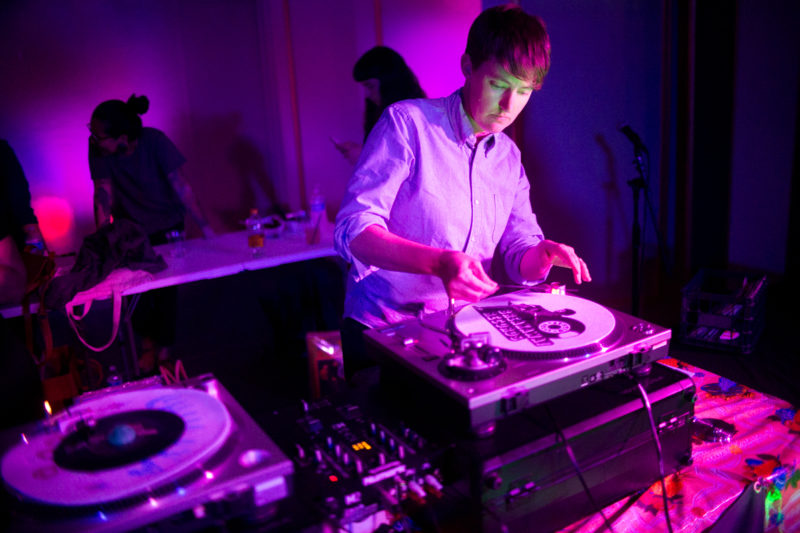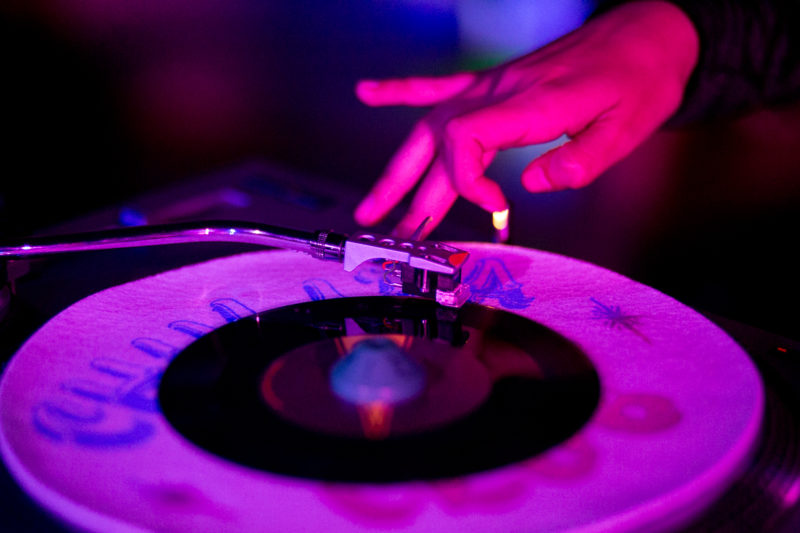Female DJs Club Aims to Break Through Music’s Gender Wall
By Molly Smith
Photography By Lynda Gonzalez
Reporting Texas

Erin Gentry, a DJ with the Chulita Vinyl Club, plays a record at Al Volta’s Midnight Bar during the Fusebox Festival in April. Lynda Gonzalez/Reporting Texas
When Yoalli Rodríguez moved to Austin from Mexico to pursue a Ph.D. in Latin American studies at the University of Texas, she made sure to bring her vinyl records with her. It was not an easy feat, considering she had been collecting them for nearly a decade.
Her records are more than just a connection to home: They offer an escape from academia and the never-ending reading lists and papers confronting the aspiring professor.
Music has been a constant throughout her academic career. During her college years in Mexico, Rodríguez, 31, wrote album reviews for campus publications and hosted a radio show about rock music on the student-run station. Her face still lights up when she recalls her first vinyl purchase after she stepped into a record store by chance. She left the store that day as a collector. “I got one and then it never stopped,” she said.
Since moving to Austin, Rodríguez has made the jump from record collector to DJ. She’s a member of the Chulita Vinyl Club, a DJ collective of women of color. The club began in Austin in late 2014 and now has 58 members spread across its seven chapters in Texas and California.
DJing is “basically what I was doing by myself at home – playing records and dancing – and now I’m doing it in public for more people,” said Rodríguez.
Claudia Saenz, 28, began the club as a way to connect women of color who collect vinyl with the DJ industry.
“I always wanted to DJ,” said Saenz. “I just never really knew how to get out there and do it.”
It didn’t help that Saenz saw few female DJs behind the decks at local clubs and event spaces.
Women are underrepresented in the music industry, and they made up only 12 percent of acts booked at 10 of the nation’s largest music festivals in 2016, according to data compiled by The Huffington Post.
“You don’t really see female DJs out there, especially DJs that are women of color,” Saenz said.
She put out a call on social media looking for fellow vinyl enthusiasts in Austin and San Antonio. Within hours of publishing her Facebook post, she was flooded with emails from longtime, female record collectors interested in sharing their music with the public.
In addition to Austin and San Antonio, the Edinburg-native started a chapter in the Rio Grande Valley. Since moving to San Jose, California, in 2016, Saenz has helped launch chapters of the Chulita Vinyl Club in the Bay Area, Los Angeles, Santa Ana and San Diego. Each week, a member or a chapter uploads a new mix to SoundCloud as a way for the women to get to know one another through music.
“Because there’s such an under-representation of women and women of color in all industries in society, Chulita Vinyl Club – even if it’s a small-scale movement – builds a platform for girls to inspire each other, to learn how to work together and value the importance of togetherness,” said Saenz, who works for a nonprofit.
“Chulita” is a Spanish term of endearment, and Saenz remembers her grandmother telling her “ay, que chula,” or “oh, how cute,” when she was a child. Saenz gave it new meaning by incorporating it into the group’s name as a declaration of female empowerment. “We are chula because we are beautiful, poised [and] confident,” she said.

Yoalli Rodríguez, who is a doctorate student at the University of Texas, plays a record during the closing night party of the Fusebox Festival. TLynda Gonzalez/Reporting Texas
Like Rodríguez and Saenz, many of the women join the group with little or no DJ experience and teach each other how to work the turntables, mix and handle transitions between songs. The sets the chapters play reflect the members’ varied musical tastes, from soul and funk to R&B and hip hop to cumbia and salsa.
Eighteen women from across Texas, Mexico and Colombia comprise the Austin chapter. Through sharing her records with the other members, Rodríguez said she realized music is borderless.
“Even if we’re coming from different places and are bringing underground music from Mexico, Colombia or Texas, music trespasses all kinds of national [and] state borders,” she said.
Xochi Solis, 36, an Austin-based artist and gallery director, heads the Austin chapter. She was drawn to Chulita Vinyl Club because she wanted to surround herself with women who shared similar experiences navigating different languages and cultures.
“I was raised in an English-only household so I learned Spanish as an adult,” she said. “I was exploring my Latinidad and my relationship with my identity as Tejana. I wanted [to find] a group of people where I could speak English and Spanish.”
The Austin native found it difficult to find that community in an increasingly gentrified city.
Solis describes the Austin chapter as comadres, a group of close female friends. “We’re really in each other’s lives and we talk about all kinds of stuff apart from music,” she said.
In addition to coming together for shows, the women also meet up to listen to music and hunt for vinyls they grew up listening to in record stores, thrift stores, yard and estate sales. Many of their collections consist of records their grandparents and parents handed down to them.
In that way, Chulita Vinyl Club also functions as a form of cultural preservation. Through collecting hundreds of records of Tejano and Chicano music, the women aim to create a historical archive of music reflecting their family history.
“Every time I see a Tear Drop Records label or a Cobra Records label, I have to collect it because it’s a part of history that I would like to have,” Saenz said of the defunct independent record labels she has come to know through collecting and learning about their artists.
Saenz never expected the interest in the Chulita Vinyl Club to take off as quickly as it has. She has heard from women in Chicago, Portland, Oregon. and all along the East Coast who want to launch chapters.
“There was a huge influx of girls interested from all over the nation after the recent election and the current political climate,” she said. “That’s when I started seeing Chulita Vinyl Club being used as a symbol of mobilization for women of color who want to be part of something that really means something.”
She plans to expand the group beyond Texas and California and to encourage more women of color to come to the front of the DJ booth.
“We all share the same [feeling] that it’s really hard to be a woman in society, and Chulita Vinyl Club is a platform for supporting each other in hard times and just overall,” Saenz said.